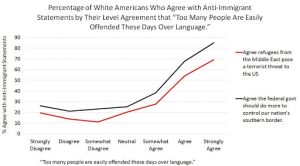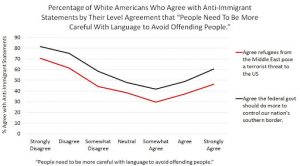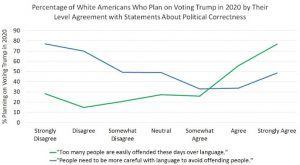Admittedly, Trump’s initial references to “the Chinese Virus” earlier in March seemed rather ad-hoc. Though clearly xenophobic in context and implication, it seemed that Trump was casually parroting the language of other far-Right commentators like Charlie Kirk. Within the past week, however, Trump has ramped up his labeling campaign, often going out of his way to refer to COVID-19 as “the Chinese Virus” in Twitter storms and White House press briefings.
Two key strategies likely drive Trump’s efforts here. Both involve distracting Americans from his own administration’s failings at dealing with the coronavirus earlier on. The first is simply to blame China, laying responsibility for America’s situation solely at their feet. The fact that a Chinese propaganda director recently suggested the virus may have originated with American soldiers who brought it to China provided the perfect (and tacitly justifiable) motivation for Trump to remind the world forcefully and repeatedly where the virus originated.
The second factor also involves distraction from Trump’s failings, but one in which “China” is only incidental. They are merely a stand-in for all “dangerous outsiders.” By repeatedly and brazenly referring to “the Chinese Virus,” and provoking a media backlash against the xenophobic implications of his language, Trump wishes to remind his base who our internal threats are: politically correct liberals who care more about defending foreigners than they do the American people.
Though Trump has previously raged against political correctness explicitly, and indeed, campaigned on it in 2016, when it comes to this recent COVID-19 labeling campaign, other far-Right thought-leaders have been doing this for him. For example, in a March 14th interview on Fox News, Arkansas Republican Senator Tom Cotton stated, “Anyone who complains that it’s racist or xenophobic to call this virus the Chinese coronavirus or the Wuhan virus is a politically correct fool, and they ought not to be listened to about anything.”
And March 20th, Former Fox News host Bill O’Reilly told Glenn Beck: “The worst thing in this pandemic virus outside of the actual illness itself of course is the political [sic] correct media still, still peddling garbage that hurts the American people.” Quoting an ABC News reporter, O’Reilly said in a whiny, mocking voice, “A lot of people think it’s racist if you call it the Chinese Virus. …It’s sickening.”
But survey data confirm that white Americans—like President Trump, Senator Tom Cotton, Bill O’Reilly, or their followers—who attack politically correct language as the enemy are in fact the most likely to hold racist or xenophobic views. In a nationally representative survey fielded in February 2020, we asked Americans to indicate how much they agreed with statements about using politically correct language. We also asked Americans for their views on refugees from the Middle East and America’s control over its Southern border.
 In the first figure [left], we see that, as Americans’ agreement with the statement “Too many people are easily offended these days over language” increases, the more likely they are to believe that the federal government should do more to secure the Southern border and that Middle Eastern refugees pose a terrorist threat.
In the first figure [left], we see that, as Americans’ agreement with the statement “Too many people are easily offended these days over language” increases, the more likely they are to believe that the federal government should do more to secure the Southern border and that Middle Eastern refugees pose a terrorist threat.
In the second figure [below, right], we see a similar trend, but in the opposite direction. The more strongly Americans disagree with the statement “People need to be more careful with language to avoid offending people,” the more likely they are to hold xenophobic views about refugees from the Middle East and to want stricter border control. 
In sum: both figures show that white Americans who voice the strongest opinions against politically correct language also hold the strongest anti-immigrant attitudes.
Just as important, they are also the group most likely to plan on voting Trump in 2020.
The last figure below shows the percentage of white Americans who indicate they plan on voting Trump in 2020 by their level of agreement with our two statements regarding politically correct language. Nearly 80% of white Americans who strongly disagree that “People need to be more careful with language to avoid offending people,” or who strongly agree that “Too many people are easily offended these days over language,” intend to vote for Trump in November. 
Seen in light of these data, Trump’s dual strategy is clear. By unapologetically referring to COVID-19 as “the Chinese Virus,” Trump is first able to signal to his white base that he too is disdainful of scheming, disease-ridden outsiders. But he can also intentionally provoke a backlash against his hurtful and xenophobic language, which he and his followers can dismiss as leftist “political correctness.” Trump shores up support against both a perceived external threat (immigrants) and an internal threat (liberals) with a single dangerous and offensive swipe.


